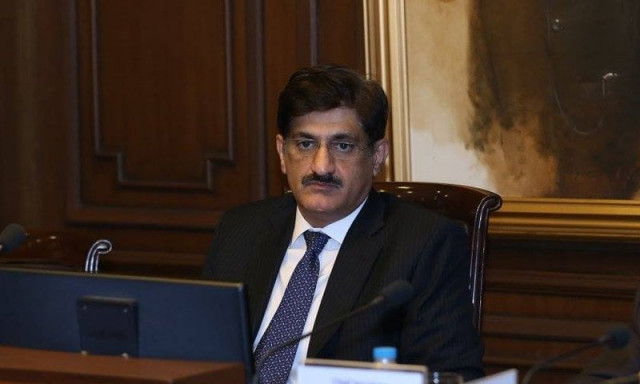Sindh loses another case for provincial autonomy
SC maintains verdict that province cannot impose sales tax on CAA

Sindh CM Murad Ali Shah. PHOTO: PPP/ TWITTER
A three-judge bench, headed by Justice Gulzar Ahmad and comprising Justice Qazi Faez Isa and Justice Ijazul Ahsan, rejected the Sindh government's review petitions against an earlier verdict that declared that Sindh cannot impose sales tax on the CAA under the Sindh Sales Tax on Service Act 2011.
SC seeks report on disputed Jamia Hafsa land
Earlier, the Sindh High Court (SHC) had also passed a ruling against the provincial government. Farooq H Naek and Khalid Javed Khan appeared on behalf of Sindh. Interestingly, other provinces had also challenged the apex court's verdict but their review petitions were not entertained.
The PPP's legal wizards fear that the judgement may affect the provincial authority to impose sales tax service on all departments, situated in the provincial territory but regulated through federal laws.
One section of lawyers believes that this verdict is one of a series of recent SC rulings, which may affect the 18th Constitutional Amendment that ensures autonomy and empowerment of provinces.
Firstly, the apex court led by former chief justice Mian Saqib Nisar upheld the Industrial Relations Act 2012 (IRA 2012) and said matters relating to trade unions and labour disputes, having been dealt with and protected under the International Conventions, are covered under the federal legislative list (FLL).
Secondly, another SC judge Justice Umar Ata Bandial while authoring a verdict declared that 'police is a concurrent subject' on which both the federal and a provincial government can legislate.
Thirdly, the SC judge Justice Ijazul Ahsan rejected the Sindh government's plea claiming ownership of three major hospitals in Karachi in the wake of devolution of the health sector under the 18th amendment. According to the decision, the federal government will continue to control the hospitals.
In the instant case, the 47-page verdict authored by Justice Qazi Faez Isa said the CAA has been empowered by the federal legislature to levy and collect air route navigation charges, embarkation charges, fees paid in respect of issuance and renewal of licenses and any examination, fees and charges in respect of commercial exploitation of the CAA's properties and landing and housing charges.
"The fees and charges levied by the CAA are under the authority of the federal legislature. Therefore, the province's imposition of sales tax in effect constitutes taxing the fees and charges billed and recovered by CAA.
"This cannot be permissible because it would mean that the province is taxing the constitutional means employed by the federal legislature to execute its constitutional powers. In doing so the province is also interfering in federal functions," said the judgement.
The verdict said the provincial legislatures are independent; they must operate within the sphere allotted to them and within their prescribed limit.
Neither the federation nor the provinces should invade upon the rights of the other nor encroach on the other's legislative domain. The pith and substance of the legislated subject is to be examined to determine in whose legislative sphere a particular subject comes under, it observed.
"Airplanes fly over the airspace of Pakistan, land and take off from airports situated in different parts of the country and also come and go from other countries flying through their airspaces.
"Airplanes carry passengers and may also transport goods and they take off and land in airports throughout the country, including the territories of the provinces.
"Airplanes also utilise facilities situated in different airports throughout the country. Since sales tax is ultimately to be borne by the users/people, therefore, if every province imposes sales tax it would make flying complex and unnecessarily expensive.
"Another adverse consequence would be to undermine the connectivity of the country. Airports situated in remote areas and in commercially unviable areas are subsidized; if such airports and the facilities they provide are subjected to sales tax these may become too expensive to use and resultantly the people will suffer."
The verdict said the if sales tax is imposed, the CAA may avoid spending money on proper maintenance of existing airports and may also be dissuaded to invest in new airports which are not commercially viable.
"This would adversely affect travel, national cohesion, the interest of the federation and of the provinces. It cannot be presumed that the people of this country had granted to every province the power to separately tax the CAA, and give the provinces a windfall.
"Airports already provide many benefits to the provinces: including a large infusion of capital, employment opportunities, strengthening of local economy, et cetera," it said.
Experts concerns
One section of lawyers is expressing serious apprehensions over the impact of the SC's recent verdict as it will undo the 18th constitutional amendment and the provincial autonomy.
"It has largely undone 18th constitutional amendment. Now any matter stretching beyond a single province falls in the federal legislative domain. A super federal list has been created," said a senior lawyer, who is disappointed over the SC's ruling.
A provincial law officer expressing doubts said the federal government can now make law to comply international treaties. Even it can legislate on the provincial subjects like health, labour, education etc for the compliance of international treaties.



















COMMENTS
Comments are moderated and generally will be posted if they are on-topic and not abusive.
For more information, please see our Comments FAQ